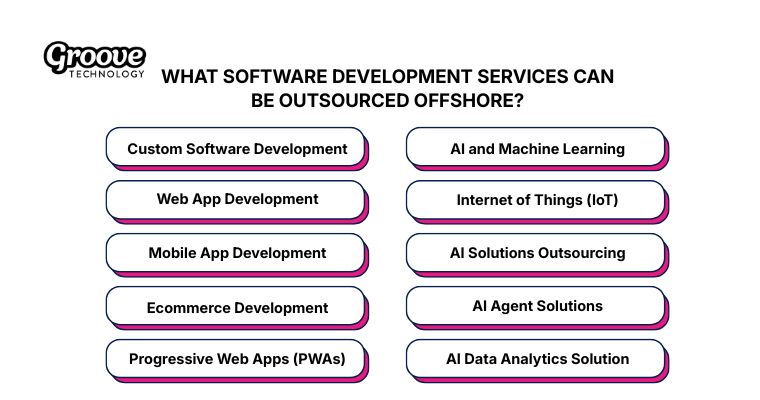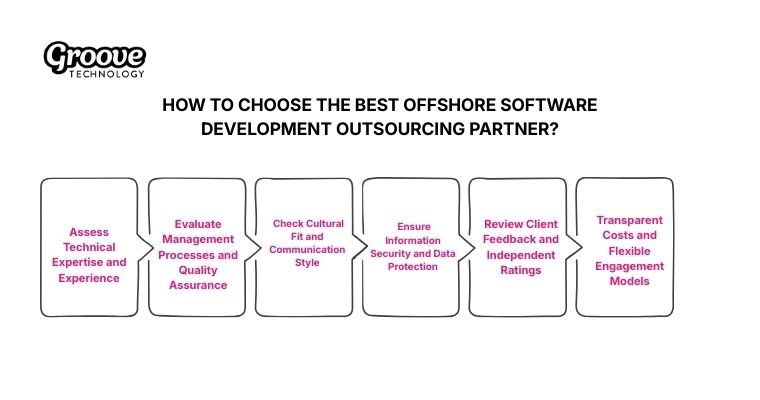What Is Offshore Software Development Outsourcing? A Complete Guide
Offshore software development outsourcing is a strategic business model where organizations partner with specialized technology firms in distant countries to engineer digital products. This approach enables companies to access global talent pools and optimize production budgets by leveraging labor markets where costs are significantly lower than in Western regions. Beyond simple cost-cutting, the model enables high scalability and 24/7 productivity, supporting a wide range of services, including custom web development, mobile apps, and advanced AI solutions.
However, successful implementation requires navigating challenges such as time zone barriers, cultural differences, and security risks. To maintain quality, businesses must follow a structured vetting process, prioritizing partners with technical expertise and robust security certifications like ISO 27001. By choosing the right global destination, such as Vietnam or India, organizations can effectively mitigate risks while driving rapid digital growth and operational resilience.
This guide from Groove Technology defines offshore outsourcing, explores its services and benefits, addresses key challenges, and compares global hubs and costs. It further details how to choose a partner and identifies which businesses benefit most. Readers will gain the strategic insights needed to select a partner that drives real operational growth. Continue reading to discover how to scale your digital capabilities effectively.

1. What is offshore software development outsourcing?
Offshore software development outsourcing is a strategic engagement where an organization contracts a specialized technology firm in a distant country to engineer digital products at an even lower price. This model enables the client to access a broader range of technical expertise and to optimize production budgets by leveraging global labor markets.
For instance, a fintech startup in Canada needs to rapidly build and iterate on a mobile payment platform but faces high local hiring costs and a limited supply of senior engineers. Instead of assembling an internal team, the company partners with an offshore software development firm in Latin America.
The approach works by distributing engineering tasks to regions with abundant talent supplies so businesses can scale their development capacity on demand. Successful project delivery relies on synchronous communication protocols because teams must coordinate complex workflows across significant time zone gaps and cultural boundaries.

2. What software development services can be outsourced offshore?
Software development services that can be outsourced offshore include every major technical discipline available at Groove Technology. Your organization can leverage these capabilities to scale production and build value immediately.
- Custom Software Development: Groove Technology develops tailored systems that align with unique business logic, granting clients full control over features and workflows instead of imposing rigid constraints.
- Web App Development: The firm creates responsive applications that function seamlessly within browsers, providing users with a native-like experience on any device without the hurdles of installation.
- Mobile App Development: Groove Technology designs iOS and Android applications that utilize device-specific features to connect brands directly with consumers through their mobile devices.
- Ecommerce Development: The company constructs secure platforms capable of processing transactions and managing inventory in real-time to support 24/7 sales operations and handle high traffic volumes.
- Progressive Web Apps (PWAs): Hybrid solutions are developed to combine web reach with mobile performance, ensuring users can access content quickly even under poor internet conditions.
- AI and Machine Learning: Advanced algorithms are integrated to analyze vast datasets, identifying patterns and automating decision-making processes for optimized business outcomes.
- Internet of Things (IoT): Groove Technology configures connected networks that facilitate data exchange between devices, helping businesses monitor physical environments and control machinery remotely.
- AI Solutions Outsourcing: The firm formulates artificial intelligence strategies aligned with specific industry challenges, providing access to advanced tech stacks without the need for internal hiring.
- AI Agent Solutions: Intelligent bots are implemented to manage customer support interactions and repetitive administrative tasks, allowing the human workforce to focus on more complex duties.
- AI Data Analytics Solution: Data tools are established to process raw information and visualize performance metrics, enabling leaders to uncover hidden opportunities and make evidence-based decisions.

3. What are the benefits of outsourcing software development offshore?
As development offshore outsourcing software becomes more mature and standardized, companies are increasingly viewing it as a long-term growth enabler rather than a short-term workaround. Here are six core benefits of outsourcing software development offshore that make it a smart long-term decision.
- Cost efficiency that fuels growth: Offshore development significantly reduces overhead by eliminating fixed local employment costs such as superannuation and long-term benefits. Instead of tying up capital in high local salaries, businesses can redirect budgets toward product innovation and market expansion while maintaining the same output quality.
- Scalability without operational friction: Offshoring allows companies to expand or contract their development teams quickly based on real project needs. This flexibility is especially valuable in volatile IT labor markets, enabling organizations to avoid the cost of idle resources while still responding rapidly to new opportunities.
- Faster time-to-market: Experienced offshore partners can assemble skilled teams within weeks, not months. Combined with time zone differences, this creates a near-continuous development cycle where progress continues even after your local team logs off, shortening release cycles and accelerating product launches.
- Access to global, specialized talent: Australian companies face a severe shortage of over 60,000 ICT workers according to Cipher Projects, but with local tech talent increasingly scarce, offshoring removes geographical limitations. Businesses gain immediate access to engineers with deep expertise in areas like AI, cloud infrastructure, and modern frameworks, skills that are often hard to source domestically.
- Sharper focus on core business priorities: By delegating technical execution to offshore teams, internal staff can concentrate on high-impact initiatives such as product strategy, customer experience, and growth planning. This separation of focus leads to better decision-making and stronger overall performance.
- Lower delivery and financial risk: Professional offshore vendors bring structured processes, dedicated project managers, and quality assurance teams that reduce technical and delivery risks. This model provides predictable costs and stronger accountability compared to relying solely on high-cost local hourly contractors.

4. What are the challenges of offshoring software development?
While many organizations choose to outsource software development offshore to unlock cost and talent advantages, this model also introduces operational complexities that require proactive management. Understanding these five challenges of outsourcing software development offshore will help you maintain visibility, quality, and control across the entire development lifecycle.
- Communication and time zone barriers: Working across countries often means dealing with time zone gaps that slow responses and complicate scheduling. In addition, unclear instructions can easily lead to misunderstandings. To address this, successful teams set overlapping working hours and rely on project management tools to keep communication transparent and aligned.
- Security and data privacy risks: Sharing source code, technical documentation, and internal data across borders naturally increases security exposure. Without strong safeguards, intellectual property can be at risk. This is why choosing partners that follow international security standards and use encrypted systems is essential.
- Quality control and technical oversight: Without ongoing oversight, code quality can become inconsistent and create long-term technical debt. These issues may not appear immediately but often surface later during scaling or maintenance. For this reason, businesses should work with teams that apply structured testing processes, regular code reviews, and automated quality checks.
- Limited availability of senior-level talent in popular hubs: As major offshoring markets mature, competition for highly experienced engineers, especially in areas like AI and system architecture, continues to grow. Reputable providers address this challenge by maintaining pre-vetted talent pools, allowing them to onboard specialized experts more quickly.
- Cultural and workflow differences: Differences in work culture, communication style, and public holidays can lead to misaligned expectations. If these gaps are not addressed early, they may affect trust and productivity. However, when companies clearly define requirements, align processes, and respect cultural differences, collaboration becomes far more effective and sustainable.

5. Which countries should your company outsource offshore software development to?
You can select from several global destinations that offer specific advantages in talent depth and economic value to match your technical requirements. Organizations planning to offshore outsource software development often evaluate these hubs to find the right balance of cost, culture, and code quality.
- Vietnam: A rising star in the global market, producing over 57,000 IT graduates annually. The region offers services at costs roughly 90% lower than US and Australian markets. Its timezone overlap facilitates seamless collaboration for US and APAC clients, with specific expertise in fintech, healthcare, and agile delivery.
- India: Home to the world’s largest talent pool with 4.5 million professionals. It offers unmatched scale for enterprise software and AI initiatives at rates typically ranging from $25 to $50 per hour. While providing immense capacity, businesses often navigate significant timezone differences when partnering here.
- Ukraine: A hub for over 200,000 experts specializing in premium technical fields such as blockchain and .NET. Developers typically charge between $30 and $60 per hour and maintain a high cultural fit with Western organizations, maintaining strong delivery standards despite regional geopolitical risks.
- Poland: Known for providing EU stability and high English proficiency. Specialists here charge between $50 and $100 per hour, offering world-class capabilities in cybersecurity and data analytics for organizations that prioritize proximity to European regulatory standards.
- Philippines: A premier destination for mobile and web development, particularly for the APAC market. With rates between $20 and $50 per hour, Filipino teams provide excellent English proficiency and strong cultural alignment, making them an ideal choice for customer-centric digital products.

6. How much does it cost to outsource software development offshore?
Estimating the cost of offshore development requires looking at both geography and expertise. Based on 2025 market data, the following factors drive investment levels:
- Global rates typically span from $20 to $90 per hour, with Asia and parts of Africa providing the most competitive entry points.
- Latin America is a preferred choice for North American firms due to minimal time zone gaps, while Southeast Asia serves the APAC region effectively.
- Central and Eastern Europe offer a premium balance of cost and high-end expertise, particularly for regulated sectors like healthcare or complex AI integrations.
- In Vietnam (specifically within the Ho Chi Minh City tech hub), competitive rates generally range between $20 and $40 per hour, providing significant savings compared to Western markets without sacrificing engineering quality.
Businesses can take a look at this comparative breakdown of hourly costs across key outsourcing hubs to help them budget effectively.
| Role / Level | Asia (India, Vietnam, Philippines) | Eastern Europe (Ukraine, Poland) | Latin America (Mexico, Brazil) |
| Junior Developer | $15–$30 | $25–$40 | $20–$35 |
| Mid-Level Developer | $25–$40 | $35–$60 | $30–$50 |
| Senior Developer | $30–$50 | $45–$80 | $40–$65 |
| QA Engineer | $20–$35 | $25–$50 | $25–$45 |
| Project Manager | $25–$50 | $35–$70 | $30–$65 |
7. How to choose the best offshore software development outsourcing partner?
Organizations can secure a high-performing extension of their local business by following a structured vetting process that goes beyond surface-level promises.
Step 1: Assess Technical Expertise and Experience
The selection process begins by reviewing a team’s specific capabilities and past project history. A reputable partner maintains a transparent portfolio that demonstrates relevant industry experience. For instance, organizations requiring AI or cloud application development should seek partners with a proven track record of similar deliveries and client satisfaction ratings of 4.5/5 or higher. Deloitte (2024) reports that 78% of businesses consider real-world experience the most critical factor when selecting an outsourcing provider.
Step 2: Evaluate Management Processes and Quality Assurance
Reliable partners follow standardized development workflows and utilize transparent project management tools such as Jira, Trello, or Asana. Furthermore, the integration of automated testing tools like Selenium or Postman is essential to ensure consistent product quality and prevent long-term technical debt. According to Accelerance, companies utilizing full QA processes reduce post-deployment errors by 40% compared to those without strict testing protocols.
Step 3: Check Cultural Fit and Communication Style
Communication and organizational culture significantly impact collaboration efficiency. It is vital to assess a vendor's responsiveness, willingness to cooperate, and transparency. Offshore teams that provide daily progress updates and utilize video conferencing for key discussions effectively reduce misunderstandings and improve productivity. PwC (2023) indicates that 65% of project failures are linked to cultural differences and ineffective communication.
Step 4: Ensure Information Security and Data Protection
Before finalizing any agreement, organizations must verify that the partner complies with international security standards, such as ISO 27001 or GDPR, and maintains clear data protection policies. This diligence minimizes the risk of data breaches and safeguards intellectual property. Fintech companies, for example, require end-to-end encryption for client data, and offshore partners must demonstrate the technical ability to implement these measures.
Step 5: Review Client Feedback and Independent Ratings
Evaluating testimonials from previous clients provides objective insights into a partner’s reliability and commitment. Platforms such as Clutch, GoodFirms, or LinkedIn offer valuable perspectives on historical performance. Clutch (2024) notes that 82% of businesses prioritize partners who have completed at least five successful projects with a rating of 4 stars or higher.
Step 6: Transparent Costs and Flexible Engagement Models
While cost is a factor, the lowest price does not always equate to the best value. Businesses should verify pricing structures and choose engagement models such as hourly, project-based, or dedicated teams, that offer the necessary scalability. Deloitte (2024) finds that businesses utilizing dedicated offshore teams increase development efficiency by 35% compared to traditional hourly-based models.

8. Which company should outsource offshore software development?
Any organization facing resource constraints or requiring specialized skills can benefit from this model regardless of their current size. You should identify where your business stands to maximize the specific advantages available to your stage.
- Early-stage startups: Founders often face strict budget limits that make local hiring impossible. A full offshore team builds your Minimum Viable Product quickly for the price of one local engineer so you can prove concepts to investors without burning seed capital.
- Fast-growing scale-ups: These companies possess product-market fit but usually struggle to hire fast enough locally. Offshore partners provide dedicated teams of 10-50 developers in weeks because hyper-growth demands immediate action rather than the months required for internal recruitment cycles.
- Large enterprises & corporations: Global corporations prioritize efficiency and continuous innovation over simple survival strategies. Distributed teams in time zones like India handle execution while headquarters sleeps so development cycles continue 24 hours a day to optimize operational costs effectively.
- Non-technical “traditional” businesses: Non-technical firms in sectors like healthcare often lack the internal DNA to manage engineers. An offshore vendor takes over the entire project including HR and technical delivery so you avoid the struggle of building an IT department from scratch.
- Companies needing specialized niche skills: Businesses with capital sometimes cannot find specific talent locally for niche technologies like AI or legacy systems. Global regions offer abundant access to experts in math or computer vision where local pools are dried up or non-existent.

9. Differences between onshore, nearshore, and offshore software outsourcing
You can distinguish these models primarily by geographic location and the resulting cost structures. Onshore keeps teams local for easy communication, and nearshore balances proximity with lower rates in neighboring regions. At the same time, offshore maximizes savings and talent access by leveraging distant countries with significant time zone differences.
- Onshore Outsourcing: Local teams provide zero cultural barriers and operate under identical legal frameworks to ensure seamless real-time collaboration. This option costs significantly more because you pay premium market rates while facing limited talent pools in your immediate area.
- Nearshore Outsourcing: Neighboring partners share similar time zones, allowing for daily synchronous meetings and easier site visits. Your business gains moderate cost savings compared to local hiring but might encounter rising rates as these regional hubs become more popular.
- Offshore Outsourcing: Distant firms offer the lowest possible costs and access to massive global talent pools for 24/7 productivity. You must manage time zone gaps with flexible schedules or asynchronous communication tools to bridge the distance effectively.
You can compare the key features of each model in the table below to decide which structure fits your project needs best.
| Feature | Onshore | Nearshore | Offshore |
| Location | Same Country | Neighboring Country | Distant Country |
| Time Zone | Identical | Similar (+/- 1-3 hrs) | Significant (+/- 4-12 hrs) |
| Cost | High | Medium | Low |
| Communication | Seamless | Easy (High overlap) | Asynchronous (Low overlap) |
| Talent Pool | Limited (Local) | Regional | Massive (Global) |
| Ideal Use Case | Complex, IP-sensitive projects | Agile/Scrum teams needing overlap | MVPs, Maintenance, 24/7 Ops |
10. Top 5 offshore software development companies in Australia
You can accelerate your digital transformation by partnering with these leading firms that have established strong reputations for quality and reliability in the Australian market.
- Groove Technology: Groove Technology positions itself as a premier partner with a 97% client retention rate and Microsoft Gold certification to guarantee excellence. Their engineers deliver end-to-end custom software and legacy system modernization to scale your digital capabilities flexibly.
- Upscalix: Upscalix fuses Indonesian technical talent with Australian project management to ensure seamless cultural integration and high engagement for your projects. This firm specializes in frontend architecture and mobile app creation that aligns perfectly with local business hours.
- VA For Everyone: VA For Everyone combines rigorous Australian oversight with cost-effective Indonesian talent to maintain strict quality standards for growing businesses. The team manages comprehensive offshore development centers and business process outsourcing that allow you to consolidate technical needs.
- Cloudstaff: Cloudstaff leads the industry with enterprise-grade security frameworks and a massive global workforce of over 6,300 professionals to support large operations. Their experts handle mission-critical custom application development and legacy system modernization while ensuring full compliance with international standards.
- Away Digital Teams: Away Digital Teams connects you with high-performing Vietnamese professionals who hold degrees in advanced technical fields to ensure innovation. These specialists implement artificial intelligence solutions and custom web applications that function as a strategic extension of your capacity.
>>> See more: Top 10 Leading Offshore Software Outsourcing Companies In Australia 2025

This guide defined offshore software development outsourcing, explored essential benefits like cost efficiency, and compared leading global destinations to clarify your options. You now possess the insights needed to assess the market and select a partner that drives real operational growth.
Groove Technology helps you achieve this technical excellence through our Australian-managed, Vietnam-based engineering teams. We build custom solutions that align strictly with your business objectives while maintaining transparency and innovation. You can contact us today to secure a high-performance team for your next project.





